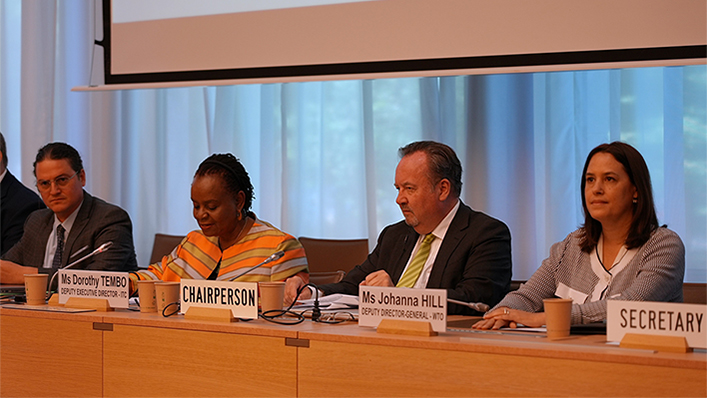
Gender-responsive public procurement
Ms Tembo called on parties to the GPA 2012 and on observers to the Committee (comprising both governments and international organizations) to help build support for the ITC–UN Women Global Campaign on Gender-Responsive Public Procurement, which was launched in March 2024. “Currently, only 1 per cent of public contracts globally are going to women-led businesses,” she said.
The campaign seeks to help women overcome barriers when bidding for government contracts. Among these barriers are complex procedures, financing constraints and a lack of information and networks to grow businesses and increase exports. Ms Tembo said, “Gender-responsive public procurement can and does lead to concrete change that benefits people’s lives,” and called for support from GPA parties and observers to make these changes possible in their respective jurisdictions.
The ITC is among the international organizations that are observers to the Committee.
Calling the GPA 2012 “historic”, Ms Tembo said that in addition to “seeking to open up public procurement markets, it sets out rules to ensure that the procedures to award tenders … are fair, transparent and open. It is an agreement that is innovative in its focus on good governance.”
The ITC-UN Women initiative is part of the global efforts to help achieve the United Nations’ Sustainable Development Goal 5 on gender equality.
WTO Deputy Director-General Johanna Hill highlighted the engagement of the ITC and the WTO in empowering women and small businesses. Noting the WTO’s earlier support of the initiative expressed as an international organization, she added: “Combining gender-responsive procurement policies with trade liberalization provides women-led small businesses with opportunities to win public contracts abroad and allows them to benefit from open markets at home, potentially as subcontractors to international suppliers.”
She highlighted how agreements like the GPA 2012 can open trade and thereby enhance and accelerate the integration of women and women-led small businesses into governments’ supplier bases. “Initiatives like the ITC’s are crucial for translating these opportunities into tangible benefits for women, their families and communities,” she said.
Accessions to the GPA 2012
The meeting also provided an opportunity for an exchange on Albania’s initial market access offer — a key document to advance the process, which had been submitted prior to the meeting. The Director General of Albania’s Public Procurement Agency, Ms Reida Kashta, stressed: “Albania is fully engaged in the process of acceding to the GPA 2012 as confirmed by the circulation of our ambitious initial market access offer.” GPA parties praised Albania for its proactive engagement. Albania’s accession would be a positive and welcome addition to the Committee, they said.
An infographic about the accession process can be found here.
The Committee also discussed the GPA accessions of China, Costa Rica and the Kyrgyz Republic. Parties also considered various matters relating to the implementation of the Agreement and achieved substantial progress regarding the Committee’s agreed Work Programmes on green, socially and economically sustainable procurement and on the participation of micro, small and medium-sized enterprises in government procurement.
The GPA 2012 has 22 parties (covering 49 WTO members, counting the European Union and its 27 member states as one party). While it is open to all WTO members, this plurilateral agreement is binding only for those members that have joined it. The list of current GPA parties and observers can be found here.
Background
The GPA aims to open up government procurement markets to foreign competition in a reciprocal manner and to the extent agreed between GPA parties. It also aims to make government procurement more transparent and to promote good governance.
Reciprocal market opening assists GPA parties in purchasing goods and services that offer the best value for their money. The Agreement provides legal guarantees of non-discrimination for the goods, services and suppliers of GPA parties in covered procurement activities, which are worth an estimated USD 1.7 trillion annually. Government procurement typically accounts for about 15 per cent of developed and developing economies’ GDP.
Next meeting
The next meeting of the Committee on Government Procurement is scheduled to take place in early October.
Share
Reach us to explore global export and import deals